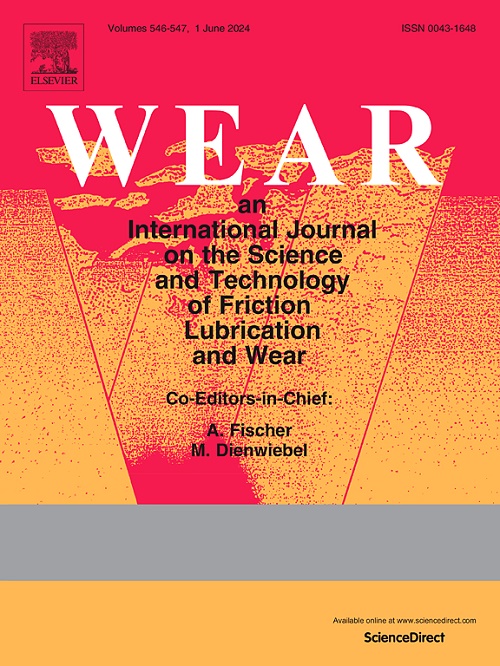The braking performance and failure mechanism of copper-based brake pads during repeated emergency braking at 400 km/h
IF 6.1
1区 工程技术
Q1 ENGINEERING, MECHANICAL
引用次数: 0
Abstract
Copper-based brake pads have played a pivotal role in the braking systems of commercial high-speed trains travelling at speeds ranging from 200 to 350 km/h. In this study, the braking performance and friction and wear mechanism of copper-based brake pads at 400 km/h were further evaluated using a full-scale dynamometer. The results show that under repeated emergency braking conditions at 400 km/h, the mean friction coefficient can be maintained at about 0.3 and remains stable within six braking cycles. Subsequently, a fade phenomenon in the mean friction coefficient emerges accompanied by a significant increase in braking distance, while the mean wear loss is relatively high throughout the entire testing process. Microstructural characteristics of the friction film and matrix indicate that strong oxidation plays an important role in the failure process of the brake pads. The friction film primarily composed of oxides exhibits numerous defects, which are susceptible to peeling off during braking, thereby compromising wear resistance. Additionally, as the braking cycles accumulate, oxidation gradually invades and weakens the matrix, leading to violent migration of the copper-rich friction film across the friction interfaces and resulting in the deterioration of friction performance. This work provides valuable insights into the failure behavior of copper-based brake pads at higher braking speeds and can provide potential direction for further improving their performance.
时速 400 公里反复紧急制动时铜基刹车片的制动性能和失效机理
铜基制动片在时速 200 至 350 公里的商用高速列车制动系统中发挥着举足轻重的作用。在这项研究中,使用全尺寸测功机进一步评估了铜基刹车片在 400 km/h 下的制动性能和摩擦磨损机理。结果表明,在时速 400 公里的反复紧急制动条件下,平均摩擦系数可保持在 0.3 左右,并在六个制动周期内保持稳定。随后,伴随着制动距离的显著增加,平均摩擦系数出现衰减现象,而在整个测试过程中,平均磨损损耗相对较高。摩擦膜和基体的微观结构特征表明,强氧化在刹车片的失效过程中起着重要作用。主要由氧化物组成的摩擦膜存在大量缺陷,在制动过程中容易剥落,从而影响耐磨性。此外,随着制动周期的累积,氧化物会逐渐侵入并削弱基体,导致富铜摩擦膜在摩擦界面上剧烈迁移,从而导致摩擦性能下降。这项研究对铜基刹车片在较高制动速度下的失效行为提供了宝贵的见解,并为进一步提高其性能提供了潜在的方向。
本文章由计算机程序翻译,如有差异,请以英文原文为准。
求助全文
约1分钟内获得全文
求助全文
来源期刊

Wear
工程技术-材料科学:综合
CiteScore
8.80
自引率
8.00%
发文量
280
审稿时长
47 days
期刊介绍:
Wear journal is dedicated to the advancement of basic and applied knowledge concerning the nature of wear of materials. Broadly, topics of interest range from development of fundamental understanding of the mechanisms of wear to innovative solutions to practical engineering problems. Authors of experimental studies are expected to comment on the repeatability of the data, and whenever possible, conduct multiple measurements under similar testing conditions. Further, Wear embraces the highest standards of professional ethics, and the detection of matching content, either in written or graphical form, from other publications by the current authors or by others, may result in rejection.
 求助内容:
求助内容: 应助结果提醒方式:
应助结果提醒方式:


